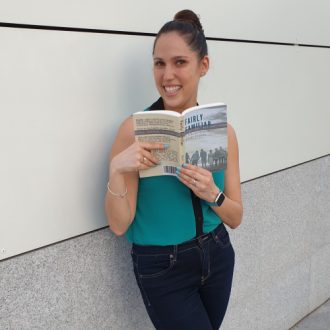
A Conversation with Expat Coach and Psychologist Gabriela
Earlier this month, we had the absolute pleasure to sit down with Gabriela Encina, an expat coach and psychologist currently living in Valencia, Spain, to talk about all sorts of topics within her expertise. The discussion included themes of expat loneliness, meaningful friendships, expat anxiety, expat dependency, getting professional support, and more. Much to our disappointment, the quality of our recording was very poor and so we are not able to share the video with you today. However, this conversation was too valuable not to share, so we have transcribed it for you! We gained so many nuggets of wisdom from our chat with Gabriela and we hope that you will enjoy it too!
Without further ado, here’s our conversation…
Dani: Hello everybody, I’m Dani from Sincerely, Spain and I’m here today with Claudia from Sincerely, Spain and Gabriela who is an expat psychologist and coach. We have met Gabriela through the #MayontheMoveChallenge on Instagram where we were impressed with her content and knew we wanted to bring her to our readers and listeners here as well. So Gabriela, could you tell us a bit about yourself, your background, and how you got into the work you do today?
Gabriela: Okay. Nice to be here, Dani and Claudia! I’m Gabriela and I am from Chile originally, I’m an Austrian citizen since 2017 and I was there since 2010 so I was living there ten years. After Vienna, we moved to Spain, where I am now in Valencia—it’s pretty hot here. I studied psychology and I graduated in Santiago in Chile, where I got my license as a psychologist and in Vienna I got my certification as a coach so I am a licensed psychologist and coach. I work with expats exclusively for seven years now and for one year and a little bit more I work exclusively online.
Dani: Cool!
Gabriela: That’s a summary, I think. [Haha]
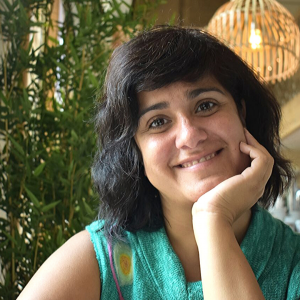 Working with Expats
Working with Expats
Claudia: And what made you want to work specifically with expats and how did it become an online thing, which is actually great for the current times we’re living in?
Gabriela: Yes, I was a visionary in a way. With expats, because I started to work with migrants and expats and refugees, actually, in Vienna and it fascinated me because I knew that they understood and I understood what they were going through, not only in theory but also because I experienced the same or similar things to what they experience. So I thought this is what I want to do, hopefully, for the rest of my life—to work with people who are struggling with life abroad.
It’s complicated; it gets really sad and lonely and that’s why I am doing that and that’s why I’m doing it online as well. Because, as an expat—not only me, but my clients—they are all over the world. My clients, and all the people that I want to work with, are spread all over the world. I have clients on five continents…six continents…I don’t know—how many continents are there?
Dani: It depends! It depends on your culture…
Gabriela: Exactly! But all the continents in the world, and that’s why it’s an advantage to me! Although I do host things locally, like some workshops, I would say 90% of my work is online.
Being an Expat Coach
Dani: Very nice. So what is an expat coach?
Gabriela: What is an expat coach? Simply a coach, or a psychologist, that addresses the typical subjects, or problems, or challenges of life that expat life brings. So, specifically with relocating, repatriation, a move abroad, or things like that—that’s an expat coach. It’s not that complicated, just a coach or a psychologist who addresses those specific problems.
Claudia: So you’re really working to address these issues from your psychology background, so it’s called an expat coach, but based in psychology?
Gabriela: Exactly. I specifically combine both—I use strategies from coaching but then I also use techniques from CBT, cognitive behavioral therapy. They are actually…I wouldn’t say similar but the goal is the same: focus on the present and achieve the goals. With different approaches, but with the same goal.
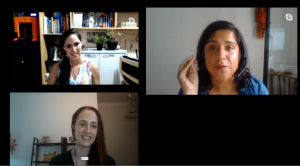 Expat Loneliness
Expat Loneliness
Dani: I see, cool. So, something that you mentioned here and that we noticed on your blog as well is the idea of expat loneliness. Could you explain what that is and what makes it different from ‘regular’ loneliness?
Gabriela: Umm-hmm! That’s pretty interesting, because I name a lot of emotions with ‘expat’ like ‘expat loneliness,’ because it is different from, like you say, ‘normal’ loneliness because we are facing loneliness from two different origins, let’s say. The loneliness if we are feeling we are having trouble finding people in our new country and the loneliness that we are experiencing because we think that the people in our home country are forgetting us, or we lose contact with them, or they move on or vice versa. So, there are two different kinds of loneliness that you can experience as an expat. That’s why it’s ‘expat loneliness,’ because when you are ‘only’ in your country there isn’t this feeling that you are left behind, so that’s why it’s ‘expat.’ A specific loneliness of expats.
Creating meaningful friendships while abroad
Claudia: And we noticed that one of your main tips, which is something that we talk about a lot as well, is about creating meaningful friendships. Could you just talk about that—what makes them meaningful friends, how do you go about them in a new country, in the country that you left? And how does that impact loneliness?
Gabriela: ‘Meaningful’ is creating deep connections. It is important to have friends to go have coffee or go out to dance or whatever, that’s fine too—and that can be meaningful too—but what I mean by meaningful is a connection on a deeper level, on an emotional level. Someone you can count on, someone you can open up to, someone you can be vulnerable with—that’s the ‘meaningful’ part of the friendship. It’s so difficult, especially when we are growing up or we are adults, it is so difficult to be open and vulnerable towards someone else.
 And that deprives us from forming deep connections, to feel supported, to feel understood. And that’s the meaning of meaningful relationships or meaningful friendships. And that, of course, can also be your friends from back home. To maintain those relationships, that can be old or that can be new, but to put an effort to maintain it that way, that’s what’s meaningful.
And that deprives us from forming deep connections, to feel supported, to feel understood. And that’s the meaning of meaningful relationships or meaningful friendships. And that, of course, can also be your friends from back home. To maintain those relationships, that can be old or that can be new, but to put an effort to maintain it that way, that’s what’s meaningful.
Claudia: And I really like this idea of being vulnerable that you’re talking about because I also believe it’s important to be vulnerable…but I think that it’s really hard to be vulnerable! So, how do we do it?
Gabriela: How do we do it? [Hahaha] It’s a very interesting question! How to be vulnerable—it’s really individual, I would say it’s really personal. Let’s say, good advice to encourage people to be vulnerable is to weigh the pros and cons of being vulnerable. Because of course, why do we resist being vulnerable? Because we are afraid, we don’t want to be disappointed, because of shame—that’s another big theme in expat life.
So, we are refraining from that…but being vulnerable has a lot of pros too, like deep connections, support, and love—in ways that you are not experiencing otherwise. You are not allowing people to see you as you really are and vice versa. So that’s a recommendation that I always make: weigh your pros and cons. And try it little by little, you don’t have to be open and an open book in an instant but try. It can be trained, vulnerability, and it can also bring along disappointment and sadness but, in my opinion, it is still worth it because the pros are really great.
Dani: Definitely.
Claudia: I really like that idea, that you can train vulnerability.
Dani: Exactly, it’s great! Of course on our blog, we get a lot of questions from people wondering how to make Spanish friends because we focus on Spain. So I’m curious to know, what is your personal experience? Has it been any easier or more difficult to make Spanish friends or do you feel it’s pretty much the same experience everywhere?
Gabriela: You know what? I’ve heard—and I’m you have too…because Claudia, you are in Finland so maybe you have a different perspective, but I have been in Austria and I am from Chile so… In the end, I would say that it’s 80% about you, 20% the country you are in, but the rest is YOU. I don’t know, you can tell me your experience, but openness can be tricky! Because somebody who is open like “Yeah, come to my house! Yeah, let’s go party! Yeah!” it doesn’t mean that you’re going to connect to this person, it doesn’t mean that you’re going to make friends with this person. It means that you’re having a good time and spending time with this person.
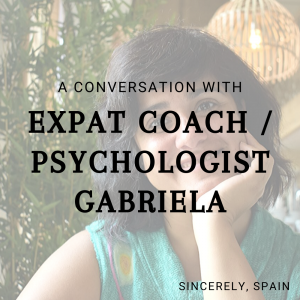 So I think a lot has to do with yourself. In my case, I can say that I had more friends, more deep connections, in Austria, than I have in Spain—for now! I’m three years here and it takes a while, I was in Vienna for almost eight years. But, yeah, I came with this prejudice that Austrian people, or eastern or central or northern European people are cold and distant and it’s very difficult to make friends with them. And yes, they are a little distant, but it’s in a way I really like!
So I think a lot has to do with yourself. In my case, I can say that I had more friends, more deep connections, in Austria, than I have in Spain—for now! I’m three years here and it takes a while, I was in Vienna for almost eight years. But, yeah, I came with this prejudice that Austrian people, or eastern or central or northern European people are cold and distant and it’s very difficult to make friends with them. And yes, they are a little distant, but it’s in a way I really like!
[Hahahaha]
…because it is really respectful. And when they open their heart to you, that’s it—there’s no coming back from that. So yeah, that’s my experience. I wouldn’t say it’s easier in Austria or it’s easier in Spain, it has to do with you. And how lucky you are to find the people that you can connect with.
Claudia: I would have to say that I relate so much to what you’ve said! Because I have this thing here where a lot of Finnish people seem to get really down on themselves because they say Finnish people are really hard to get to know. And then I think about it and, yeah, in Spain it’s really easy to have lots of people to go out to get coffee with and that’s more difficult here. But, on this deep, profound level, to create these meaningful relationships that you’re talking about it takes a lot of work on both sides and you have to find someone that you’re willing to invest in and that’s willing to invest in you. And I think that’s really special, wherever you are.
Gabriela: Umm-hmm, and it’s difficult wherever you are! As you get older, it gets more difficult, sadly.
Dani: Yeah, right now I imagine, working online—I work online too and Claudia, you’ve been mostly working at home during the pandemic—so it’s like impossible to make new friends. Well, I guess we met online and we’re talking today! [Hahaha]
Gabriela: Oh really!? You met online?
Dani: No, no, I meant us [with you, Gabriela].
Gabriela: Oh yes, I’m sorry!
Dani: No, no problem. Well, we did meet at an intercambio, a language exchange, so—
Gabriela: Oh! That’s another—sorry to interrupt you—but that’s another advice and I give this advice always. That’s a great way to connect in a meaningful way. Because it’s regularity, it’s every week, and you have to talk! About the weather, whatever, and then after two, three months, woo! So that’s a really great way to meet new, meaningful friends.
Dani: Definitely! Well, changing gears a little bit. We also wanted to talk about expat anxiety.
Gabriela: Uff, uff!
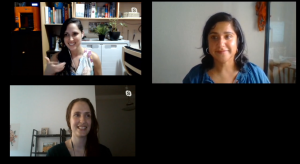 Expat Anxiety
Expat Anxiety
Dani: Yeah, because we know this is maybe the opposite side of the friendship coin. It can be very difficult and it sounds like something we’re all susceptible to. So could you talk about what expat anxiety looks like?
Gabriela: Umm, okay. So I’m saying this is exactly like ‘expat coach’ or ‘expat loneliness,’ but we expats are a very vulnerable group. That’s one thing because we are experiencing, especially in the first years—I wouldn’t say months, I would say years—so the very first years we are experiencing a lot of adapting to a lot of differences because of stress, a lot of languages, a new culture. If you have kids, the new experience at school, the relationship, if you are with someone, friendships, etc, etc, etc.
AND the common thing is that we don’t allow ourselves to talk about it because, usually, we are with this, I would say, stigma of:
-You are having “the life!”
-You are living abroad
-Maybe you are making a lot of money because of your partner or because of your work, so it’s a great opportunity.
-You are in a different country so this is a once in a lifetime thing and you have to seize the opportunity.
-This is an adventure.
All of these expectations that you have for yourself—or that you think the others have for you—these generate and exacerbate anxiety. So that is expat anxiety, the stigma that you have to be okay and you can’t say you aren’t living the life and the challenges of expat life. OH! And also that your support system, your network, it doesn’t exist or they’re the friends of your partner or some people that you don’t really trust, not yet. So those are the risk factors of expat anxiety. Did I make myself clear?
Claudia: No, it was really clear. I think for me there are a couple things you talk about that I really like. One: that it’s not months, it’s not weeks, it’s after years that we’re adapting. And I think Dani and I see a lot of people who are like “I’m gonna go and study abroad in Spain for five months,” and we think that’d great, but you shouldn’t expect to experience and conquer all your fears and have time to settle down in the same way as if you were going to go and live somewhere for five years. So I really like that.
 And I really like just that you’re talking about anxiety because I suffer from anxiety and I wouldn’t necessarily say that it’s always expat anxiety. It’s just plain ol’ anxiety! About work, about whatever it is I have to get done. And I feel like when I talk to people about anxiety they’re like “Oh yeah, that happens to me in this situation.” And it all goes back to vulnerability because we’re all so afraid to show this other side because we’re supposed to be living this amazing life, that I chose, so far away from home, it’s exotic in whatever way. So I really like that we’re just talking about it. And I think that that can help me realize that what I feel is normal.
And I really like just that you’re talking about anxiety because I suffer from anxiety and I wouldn’t necessarily say that it’s always expat anxiety. It’s just plain ol’ anxiety! About work, about whatever it is I have to get done. And I feel like when I talk to people about anxiety they’re like “Oh yeah, that happens to me in this situation.” And it all goes back to vulnerability because we’re all so afraid to show this other side because we’re supposed to be living this amazing life, that I chose, so far away from home, it’s exotic in whatever way. So I really like that we’re just talking about it. And I think that that can help me realize that what I feel is normal.
Gabriela: Absolutely, absolutely. I post about it on Instagram as well and, especially with those kinds of topics I don’t have so many comments on the posts but I have a lot of responses privately. Exactly because of this, because of the shame, because “I don’t want my family to know,” “I have my mom on Instagram and if she sees this she is going to get worried,” or my friends from work, or whatever. So this anti-vulnerability and this shame are exacerbators. […] This shame, this “no, no, no, they can’t know I’m having a hard time!”
Like you said, it’s just ‘normal anxiety’ but normal problems for normal people that are underlined in the life abroad because you are “not supposed to” feel this way. And that really— argh!—it IS normal and I am a very very big supporter and promote negative emotions. We tend to hide shame, jealousy, envy, anxiety, and fear, frustration because we are “supposed to be” in a way that we think other people expect. That’s the other thing—there’s a lot that’s just in our head when it comes to the things that we think other people expect from us, but we don’t know that because we haven’t asked them! So, yeah…sorry. That’s another topic, I get really passionate about it!
Dani: No, it’s so true though! I’m constantly thinking “well they will think I’m lazy or they will think I’m not taking advantage or they…whatever. And, thankfully, my friends or my mom will say “But who’s ‘they’?” Everyone you care about understands and everyone you care about supports you, you’re just creating this expectation from somebody who doesn’t even, perhaps, exist.
Gabriela: Umm-hmm, umm-hmm. I call it the ‘audience.’ It’s your audience and you’re speaking to the audience and you’re behaving according to the audience…that’s you!
Dani: That’s a good point.
Claudia: So, if you are supporting someone who is going through this kind of issues, especially in the case of expat anxiety, what would you recommend they do? Is one of the things you’d recommend they do is think about “Hey, who is your audience? Who is it you’re trying to talk to? Who is it you’re trying to hide these feelings from?”
Gabriela: Umm-hmm. An exercise that I do that sounds really simple but that takes a lot of courage—and if you work with me, you have courage, so it’s okay!—is to ask. To ask the people that you think are going to think something. Like, I don’t know: “My mom is going to be so worried if I tell her…” So, ask her! Or tell her, but do it mildly. Not telling your mom that you are suffering from anxiety but that you are not sleeping well or that you get fearful sometimes, you know what I mean? And see the reaction.
 Of course, if you call your mom crying and “Mooom!” then, of course, the reaction is not going to be rational and the reaction you are expecting it to be. But to assume, without asking your audience…it’s wrong! It’s not helpful and it creates more anxiety. So, to answer your question: researching, asking your audience what they think about something in particular that you are afraid of.
Of course, if you call your mom crying and “Mooom!” then, of course, the reaction is not going to be rational and the reaction you are expecting it to be. But to assume, without asking your audience…it’s wrong! It’s not helpful and it creates more anxiety. So, to answer your question: researching, asking your audience what they think about something in particular that you are afraid of.
Claudia: I really love this whole idea. Because, firstly, you are saying normalize what you are feeling. See that other people are feeling it and don’t worry, you’re not alone. And then you are saying put it in a box that is rational. You are not making it up in your head, you are not making it more than it is. Say “okay, this is what I’m feeling, this is what other people think about it”—and of course, that doesn’t make it go away but it can help you see it from a different viewpoint.
Gabriela: It helps you see it from a different viewpoint but also to embrace it. And once you embrace it, that’s the first step to heal. If you deny the things that you are feeling, then it’s exacerbating that feeling and it comes in different ways and it gets bigger and stronger. Once you embrace it and you know that you have negative feelings and you have shadows—just like everybody else in the world—once you accept, it’s the first step to feeling better. But if you deny it and deny it and hide it and hide it? No, it’s not going to happen.
Getting Professional Support
Dani: I feel like, kind of in the same way you are saying that we have to bring out the fact that it’s normal to have anxiety and it’s normal to have these feelings, it’s also important—and I love that nowadays coaching seems like such a common thing that people do. And people have mentors and people have therapists and I feel like we are taking away the stigma of it. And in the past, I would have thought “Oh, you have to have very horrible anxiety to go see someone.” And I don’t think that’s the case. What is your advice? How do you know when it’s something that you can handle on your own and how do you know when it’s something that you should get some professional advice or assistance with?
Gabriela: Oo, that’s a very good question, but it’s also very, very individual, very, very personal. But, as long as it affects your life in a way that you feel you’re losing control of everything. Because that’s what I wanted to say about anxiety as well—a lot of people will say or tend to think that anxiety is panic attacks. You know? If you are suffering from panic attacks then you have anxiety, if not it’s just fear or a little bit of nervousness. But…
-if it affects your life in a way that you can’t concentrate
-that you can’t enjoy what you are doing because you are so focused on the future that you are not actually enjoying anything that you are doing!
-if you are not sleeping well
-if you are not eating well
-if your relationships are being affected by it
-if you are more irritable
-if you feel like picking a fight every time
-if you are always on edge
 Those are symptoms of anxiety. If you feel your life is in a way that you can’t manage it, although you ‘should’ manage it—I hate that word!—if you can’t, go and get help, please!
Those are symptoms of anxiety. If you feel your life is in a way that you can’t manage it, although you ‘should’ manage it—I hate that word!—if you can’t, go and get help, please!
And as you mentioned in your email, talk to somebody. That’s the first step—talk to somebody you love, to your priest, your best friend, a coach, a doctor, a therapist, anybody. But talk, talk, talk, talk! Because that’s the enemy of anxiety, of shame, of loneliness, of envy, of jealousy—talk about it!
Dani: Is there any harm in talking to someone you love? Because, I wonder what your advice is if it’s your husband or your roommate or someone who is very close to you, could they have a bias that is not as helpful to you?
Gabriela: That’s a different thing…and it’s great that you ask it. Because “talk about it” doesn’t mean that the other person is going to take care of you or it’s going to ‘heal it.’ Those are different things. “Talk about it” means explaining and expressing what you are feeling but don’t expect—if it’s not a professional—talking about it is not getting advice or feeling “my husband is going to help me and he’s going to cure my anxiety,” no!
And I’ve heard that; it sounds like “no, that doesn’t happen” but, I’ve heard that. People think “Oh my husband knows what he’s doing so he will cure my anxiety.” I understand the expectation, but it can be really damaging if you are expecting that from a person who is not a specialist. But “talk about it” is the first step to ‘kill it’, to address it, and with that expectation, you can do it.
If you are talking to someone who is not a qualified that can be a little dangerous, so “talk about it” is talk about it, it’s not getting professional help from a friend or a family member.
Claudia: And, so, I really like what you are saying. For me, you say something and it lines up in order! Like, first I have to recognize that this is my problem and then I have to start dealing with it with the people who are involved in my relationships, and then I have to start talking about it—probably not with the people who are directly involved in some of this pressure that I’m feeling, but some other people—and if I’m still feeling and thinking about, then I should probably talk to a professional.
Because, even if it’s just one session, that person will have outside insight that I’m probably ignoring right now because I’m feeling and living all the different things. So, now I have a question that is: how do you choose who you want to talk to? Because you said that you work with people who are courageous, it’s necessary to have courage. So, from your perspective as somebody who is working as an expat psychologist and coach, how do you know when someone’s a good fit? And what should I be looking for if I’m looking for someone in your position?
 Gabriela: Okay, so you’re asking for my opinion as someone who is working as a psychologist, what is a good fit? Or my perspective as a client?
Gabriela: Okay, so you’re asking for my opinion as someone who is working as a psychologist, what is a good fit? Or my perspective as a client?
Claudia: As a client, what should I be looking for? I mean, you’re obviously a professional, you’re certified—which I’m guessing is the first thing: look for someone with a certification in what they’re doing—but then how do you determine from there? Because I guess you want the feeling you’re talking about…
Gabriela: Yes, and that’s it. I mean, you can say a lot of things. Like, one thing that you said first was that the person is certified. Because there are people that are coaches, then there are certified coaches, others who are also psychologists. If they say they are a psychologist, then confirm that they are a licensed psychologist. Also, experience helps as well. But, in therapy, as in coaching, I would say—and there is data about therapy, I don’t know about coaching—but about 65% of the success of therapy is about the relationship. So it is fundamental that you have a good relationship with your coach, with your therapist, with your psychologist.
And how do you know that? It’s not always easy. Sometimes there’s “love at first sight” but sometimes you have to be patient, to be willing… That’s what I want to say, you have to be willing to build a relationship with your psychologist or with your coach. If you are looking for the magical solution, it’s not going to happen. And someone is offering the magical solution, run away as fast as you can! Because that doesn’t exist—period! Please! Because I read this a lot, these promises and “if you work with me, all your problems are going away and they’re never coming back”—ahh, no.
It’s important to know that it’s a process. And the process takes time. If you are dealing with things so deep as anxiety, two sessions, three sessions, four sessions are not going to be enough. If you are dealing with making a decision and this anxiety is caused by this decision that’s different—because it’s about making the decision. So it’s about the problem, it’s about the relationship, and if you connect with the person.
I’ve got a lot of clients from Instagram and they connect with me because of some post that I made, or some video, or whatever and they are already a stage up in the relationship-building because they connected with me, you know? Then again, we met in person and then we developed this relationship. I have said no to some people contacting me, because, usually, I know people that say:
“Okay, but you are going to do this for me?”
“But you are going to give me the solution?”
“You are going to help me resolve my problems as fast as you can, no?”
And, of course I am summarizing, maybe not in those words. And they are very nice and everything, but I have to be honest with them and myself. That doesn’t exist or I am not providing that so I don’t know if I answered the question. But, mainly the relationship with the person you are aiming to work with.
Claudia: Yeah, I think that’s fantastic. And also I think it goes back to the friendship that we were talking about earlier. You have friends that you go out to coffee with in the same way that you have therapists that you make decisions with. And you have therapists that you are supposed to deal with more things with and if you want to deal with the deeper things than you have to work towards that deeper relationship.
Gabriela: Exactly, exactly. Another thing, because that happened a couple of days ago, I met someone and I said no to her because she wanted to address something particular BUT she said “No, I don’t want to cry in your sessions. For me, it is important not to cry and not to address those emotions because I don’t want to deal with that.” So, she was putting boundaries…and that’s okay, I respect that, but I can’t work with that. And so I told her that we are not a good fit and I actually recommended her another coach.
But it’s very important to regulate the expectations because, in the end, we are persons as well, we are not magicians! We are not going to ‘cure’ you with just saying two words. There’s a lot of show in coaching as well, you know? Like there’s this person and they have a lot of audience of 2,000 people and they talk to you and after ten minutes you’re cured. You know? It can be, but it’s not the normality. So, regulate your expectations when you are looking for help from a professional.
What else should we know?
Dani: Perfect. So, obviously we know you deal with many topics—not just expat loneliness, not just expat anxiety, so could you tell us a bit more about what are some common topics you work on with clients? What is a regular session—well, I guess there are no ‘regular’ sessions—but what might one session look like or feel like?
Gabriela: I can’t…I mean, I have a problem to answer that because every session is really different. But I can talk about the problems apart from loneliness, anxiety, and shame there’s a lot of…I call it involution, I know that is not a proper word for it in English but it is the opposite of evolving, you know? Devolution, unvolution, I don’t know! But I’ve heard it so much, clients say:
 “I feel like a toddler”
“I feel like a toddler”
“I feel like a baby”
“I feel dependent on my husband, my wife, my partner, the family of my partner, my colleagues”
“I’m not able to be myself, to be myself to display all my qualities and my perks because I feel like I depend all the time.”
“And I feel like I’m not capable of what I can because of the language, because I don’t understand who I am here.”
“My identity here is not the same as I had in my home country and I don’t know how to develop it.”
“I don’t know how to go for a coffee alone or to the doctor alone, etc.
So that’s a really big issue…yeah, devolution? I’m still trying to find a word for it, but that’s what it is: going backwards, in a way.
Dani: Like regression, maybe?
Gabriela: Yeah, like regression but for me, regression is really psychoanalytic, but yeah it’s like going backwards. It’s that…what else? For the expat spouses, it’s…
-finding a job
-giving up your financial status, your academic status
-and being ‘nobody’ in this new land.
-You were a very important manager or professor in your country and your salary was very good, but here you can’t apply to jobs because you don’t speak the language.
-You can’t teach because you don’t speak the language or you don’t have the contacts to get a job, etc, etc.
That’s another big problem…AND—oo, I could go on forever!—relationships: your romantic relationships with your husband or your wife or your partner, that’s a very big topic. And it’s all related, right? It’s not one thing, that’s all related and the relationship suffers.
“I feel frustrated.”
“I feel like I’m going backwards.”
“And I don’t have any friends to complain about you.”
“And I can’t vent because you’re the only one I have right now.”
And that affects, a lot, the relationship.
Dani: That makes sense.
Claudia: So, now I’m just kind of curious, because you seem to really love what you do and love being abroad and yet there are so many things that expats have to deal with. So, what’s something amazing about being an expat?
Gabriela: Oh, there are so many things!
Claudia: I’m so glad!
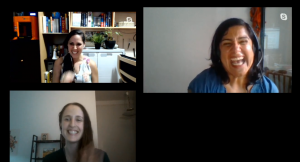 Gabriela: Yeah, yeah, yeah, I’ve heard that, like “Oh you talk about so many negative things” and yes, I tend to because they are not talked about! But yes, thank you for asking this.
Gabriela: Yeah, yeah, yeah, I’ve heard that, like “Oh you talk about so many negative things” and yes, I tend to because they are not talked about! But yes, thank you for asking this.
-Experiencing things that, in your home country, you would not be able to experience—landscapes, tastes, smells, and people.
-If you don’t speak the language and you are not there, then you are never going to meet these people.
-Adventures that you are not going to have if you stay in one place.
-The languages, the brain cells are activated because of you learning languages.
-I don’t know…the experiences, I would summarize.
-The experiences of being abroad and the relationships that you can develop if you are open to it.
-The culture, for me, is very important.
-The tastes are very important because I love food—the smells, the tastes! Even though we live in a very globalized world, it is not the same to eat tacos in Mexico as it is to eat them in Finland or Spain.
[Dani and Claudia: Hahahaha, nods]
It’s always that plus, that bonus, that you are going to experience only if you travel, only if you live abroad. And the longer you stay, the better and the easier it is to adopt features or characteristics of being abroad.
Dani: Definitely!
Gabriela: I hope that’s optimistic enough. [Hahaha]
Claudia: Yeah! I just wanted to make sure that, as we get to the end, everyone knows that you’re going to face these things when you’re abroad. And sure, you’re going to face these things if you stay at home too, but if you go abroad there’s all these other opportunities and adventures—I love the word adventures!—that you would not have back home.
Gabriela: Yeah, and like you beautifully said, you’re going to experience bad things if you stay at home too! Everywhere you’re going to face challenges, but the thing is to see them and to address them. If you do that, your experience is going to be so much better! And, imagine, if the people who are hearing or reading our conversation are experiencing some of these subjects, some of these challenges. If you address these challenges your experience is going to be so much better, so much more positive, so much more intense, in a good way. If you ignore them, they are going to color so many of the good things about life abroad.
 One final piece of advice
One final piece of advice
Dani: Absolutely! Wow, Gabriela, thank you so much! Before we wrap things up we did have one final question. If you could give one piece of advice to our expat listeners, readers, whoever, what would it be?
Gabriela: Ahh, do your thing. What do I mean by that? Be whoever you want to be, don’t lose your essence. If you think somebody’s not going to like you for whatever—because your laugh is too strong, because your voice is too loud, because you don’t speak perfectly the language because you speak with an accent, whatever, because you hug too much or because you’re too distant—it doesn’t matter! You are going to attract the people that you want in your life. I’m really passionate about this and I did it myself.
One thing is to adapt and one thing is to integrate but another is to lose yourself in the process. Don’t ever lose your essence because you are wonderful the way you are! You can tweak a few things, maybe, but the essence of you is YOU, that’s the wonderful of you, so please don’t lose that.
Claudia: Wow, wow!
Dani: I’m so inspired!
Claudia: That was so beautiful.
Dani: Seriously!
Claudia: Yeah, wow.
Dani: Well thank you so much! This has been a wonderful conversation.
Gabriela: You are welcome! Thank you two for having me and for this lovely conversation, yes. Thank you very much!
If you have enjoyed this conversation with Gabriela, please be sure to connect with her! You can follow her on Instagram, read her blog, or inquire about coaching here.



